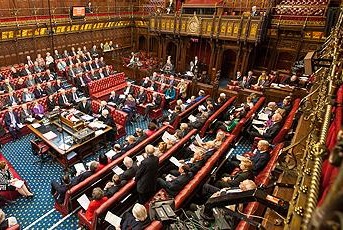Among multiple defeats for Bill, Lords vote to retain 'magnificent' Hardial Singh principles on immigration detention
In a punishing second day of voting on the Illegal Migration Bill in the House of Lords yesterday, the Government suffered no less than eleven defeats.
 Image credit: UK GovernmentThe Government had already been defeated four times over the Bill last Wednesday.
Image credit: UK GovernmentThe Government had already been defeated four times over the Bill last Wednesday.
Among the amendments made to the Bill yesterday, the Lords voted to remove provisions increasing the amount of time that children and pregnant women could be held in detention.
Lord German told the Lords: "The detention of women and children marks a major shift in public policy in the UK that we live in. Detention is no place for pregnant women, for the health of the woman or her unborn child. The Royal College of Midwives views the detention of pregnant women as harmful: it increases the likelihood of stress and impacts the unborn baby's health, as well as interrupting access to maternity care. The Government intend to have a Bill that has no exceptions. What is driving that forward in this detention policy is the argument that it will create a deterrent, and it is shocking that they are rolling back the safeguards we have in current legislation."
The Lords also voted in favour of Lord Carlile's amendments designed to confirm that the lawfulness of immigration detention remains subject to the principles established in common law and the case of Hardial Singh.
Lord Carlile said they are "magnificent principles, created after repeated cases following our common-law tradition of creating sound precedent when there is not statutory law in place that is lawful."
Lord Carlile added that the Government's overall claims for the Illegal Migration Bill were not based on reality.
He continued: "Above all, we in this House are entitled to expect the Government to obey the law. They cannot send anyone to Rwanda; it is unlawful. The Court of Appeal found that the risk of unlawful refoulement from Rwanda meant that the Rwanda scheme was unsustainable. Furthermore, when the statistics for June—which I mentioned in the House last week—were recalculated yesterday, they showed that the number of people coming on small boats has reached record levels. So it is not exactly the deterrent that the Minister has been calling for repeatedly, unless they are going to change their approach and say, 'Come to Britain in your small boats; it's the quickest way of getting to Rwanda and to the two-star hotel accommodation that is being supplied there'. We are not in a realistic situation, because they can send nobody to Rwanda at the moment."
The Constitution Unit at University College London (UCL) has a useful summary page showing all government defeats in the House of Lords, and it summarises the 11 amendments that were voted through yesterday as follows:
- To require the Secretary of State to consider a protection or human rights claim if the applicant has not been removed from the UK within six months of being deemed inadmissible and to disapply other provisions of the Act at this point.
- To add a new clause to prevent LGBT people being removed to countries where they have a well-founded fear of persecution; or to a country which is subject to proceedings under Article 7 of the Treaty on European Union.
- To retain the existing limit of 24 hours for the detention of unaccompanied children.
- To retain the existing limit of 72 hours (or one week with ministerial approval) for the detention of children.
- Paving amendment to retain the existing limit of 72 hours for the detention of pregnant women.
- Paving amendment to confirm the that the lawfulness of immigration detention remains subject to the principles established in the common law, including the Hardial Singh principles that limit detention powers.
- To limit the Secretary of State's power to transfer a child out of local authority care by restricting this to cases where it is necessary to safeguard and promote the welfare of the child.
- To exempt people who have been unlawfully exploited in the United Kingdom from removal during the statutory recovery period for potential victims of slavery or human trafficking.
- To require the Secretary of State to make provision by regulation about when it is necessary for a person to be present in the United Kingdom to cooperate with an investigation or criminal proceedings in relation to slavery or human trafficking.
- To replace a clause in order to remove the time limit for serious harm suspensive claims and to remove examples of harms specified as not serious harms for the purposes of serious harm suspensive claims.
- To remove a clause that would have prohibited courts or tribunals from granting interim remedies that prevent or delay the removal of persons from the United Kingdom.